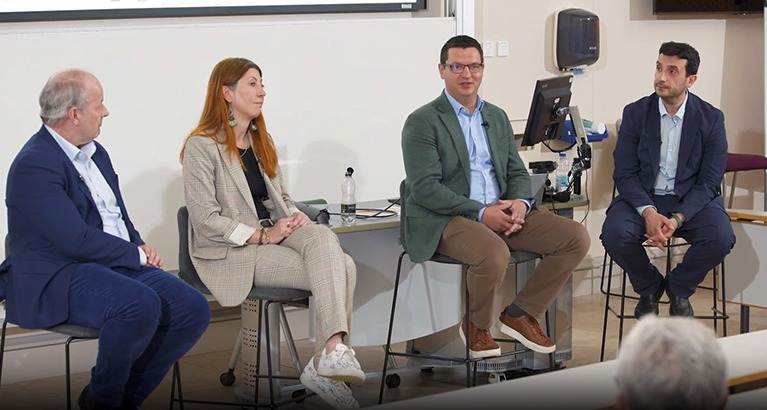
A recent poll by the University of Cambridge shows that around two-thirds of the UK population are worried about getting diagnosed with cancer. Scientists and entrepreneurs around the world are racing to develop new cancer treatments to combat this life-threatening disease. We talked to Nektarios (Aris) Oraiopoulos, Professor of Operations & Technology Management at Cambridge Judge Business School, on how biotech companies can make an impact in combating cancer.
Aris, together with Dr Donald Drakeman and Dr Lisa Drakeman, Research Fellows at Cambridge Judge, co-authored a book ‘From Breakthrough to Blockbuster: The Business of Biotechnology’. The book describes the long journey of creating new medicines – from academic labs to the patient – and shows how small entrepreneurial biotech companies have created more life-changing novel medicines for less money than the largest and most experienced firms of the pharmaceutical industry. In oncology, a 2024 study by healthcare firm IQVIA also found that emerging biopharma companies were responsible for 60% of global oncology clinical trials.
As the authors explain, the discovery and development of novel medicines that target complex diseases, such as cancer, is an environment characterised by the highest degrees of uncertainty and ambiguity. In those environments, having many independent companies trying a wide range of approaches outperforms more focused and narrow research strategies that might prioritise incorrectly the wrong projects. This happens because in the early stages of a new technology it is impossible to accurately predict its potential. A case in point is the development of checkpoint inhibitors, a class of medicines that have been one of the most effective cancer therapies.
The example of checkpoint inhibitors: a very successful cancer therapy
The development of checkpoint inhibitors (immunotherapy drugs that help the immune system attack cancer) demonstrates the intricate and unpredictable nature of drug development. The field was revolutionised by the independent discoveries of Jim Allison in the US and Tasuku Honjo in Japan, who showed that by blocking (inhibiting) certain molecules that act as brakes for our immune system (the checkpoints), our immune system can combat cancer more effectively. These findings, for which they received the Nobel Prize in Physiology or Medicine in 2018, were completely revolutionary at the time, as most researchers were focused on directly targeting cancer cells, not on manipulating the immune system to fight the disease.
Checkpoint inhibitors have emerged as one of the most successful classes of cancer therapies. Medarex, a company founded by Donald Drakeman, led the discovery and development of 2 cancer medicines, YERVOY and OPDIVO, which are currently being used for treating a wide range of cancers.
The importance of investment in biotech
Investors are crucial for startups, but, unfortunately, it’s not enough to have a great scientific idea most of the time. In a recent video interview with Cambridge Judge host Conrad Chua, Executive Director of the School’s MBA programme, Cambridge MBA alumnus Karl Bergman (MBA 2012), who is CEO of early cancer screening company Elypta, says entrepreneurs need to show the value to investors throughout the journey. Otherwise, even a good innovation project can be cut off. Early-stage projects are the most challenging environment for investors, he says, and that’s when investors need expertise from scientists in order to better understand a fledgling project.
So what motivates investors to take the risk? While all investors aim to bet on the most transformational and impactful discoveries, there is a huge element of personal judgement on what would make the cut. As the authors note in the book: “Great numbers of life sciences discoveries, even patented ones, fail to attract any investment interest, but, from time to time, a venture capitalist who hears about an especially interesting technology or potential product may consider starting a new biotech company to take advantage of that discovery.
“Venture capital firms play an instrumental role at each step of this long and turbulent journey: beyond providing the money and the financial expertise they help promote the company’s story to other investors and partner companies, provide access to critical resources such as experienced executives and contract research organisations.”
Venture capital firms play an instrumental role at each step of this long and turbulent journey: beyond providing the money and the financial expertise they help promote the company’s story to other investors and partner companies, provide access to critical resources such as experienced executives and contract research organisations.
What does a biotech entrepreneur look like?
There is no standard composition or formula for a biotech entrepreneur, and the authors note that a person doesn’t necessarily need to be a top-end scientist to run a biotech venture. Running a biotech company clearly involves laboratory work and clinical testing, but also fundraising, establishing partnerships, marketing and many more aspects – so it’s important to find the right people to run different parts of the process.
In the book, the authors suggest a set of questions to see if someone is a good fit for the entrepreneurial journey of biotech:
- Do you always think there is a better way to do things?
- Are you willing to take on just about anything, even if you don’t know much about it?
- Are you comfortable taking risks?
- Do you like doing new things, or do you prefer routine?
- Can you accept rejection and failure?
The role of universities in healthcare/cancer treatment development
Finally, the authors note that: “In many business sectors, consolidation around early winners offers competitively valuable economies of scale. In contrast, our research shows that the development of novel medicines is considerably more efficient in the hands of large numbers of independent entities. Impressing growth of the broader ecosystem that generates and supports these companies: from the academic labs to investors to contract research organisations means that more and more companies will be able raise enough cash and development expertise to move their products forward and make those novel therapies available to patients.”
At the same time, it is worth noting that those achievements have often been extremely costly to achieve, even for the capital-efficient biotech industry. For many patients, medical breakthroughs have been life-saving, but they have rarely been cost saving. As a result, access to novel medicines has been increasingly expensive, which has been a challenge for health systems around the world.
Universities are an essential part not only of the drug discovery and development process, but also in facilitating discussions about the implications of pricing and reimbursement policies on innovation and affordability of new medicines.
“The University of Cambridge is one of the biggest and most influential biomedical campuses in Europe where breakthrough medicines are being discovered,” Aris says. “Our role is to educate scientists, business and society and help them to make the right decisions.”
“The University of Cambridge is one of the biggest and most influential biomedical campuses in Europe where breakthrough medicines are being discovered […] Our role is to educate scientists, business and society and help them to make the right decisions.”
Featured research
Drakeman, D.L., Drakeman, L.N. and Oraiopoulos, N. (2022) From breakthrough to blockbuster: the business of biotechnology. Oxford: Oxford University Press.
Cambridge is changing the story of cancer
This year we’ve been highlighting cancer-related news and stories from Cambridge Judge Business School as part of a University of Cambridge-wide campaign, Cambridge is changing the story of cancer.





